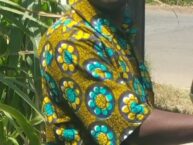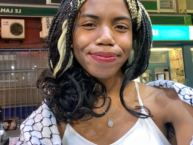 My name is Nhlanhla Junior Ngulube. I was born in Zimbabwe, raised in Johannesburg, and now live in China where I am pursuing my Masters degree. I hold an undergraduate degree in Accounting (With honors in Finance) from the University Of Cape Town. Writing, however, remains my primordial love, I particularly love writing about relationships as my subject matte.
My name is Nhlanhla Junior Ngulube. I was born in Zimbabwe, raised in Johannesburg, and now live in China where I am pursuing my Masters degree. I hold an undergraduate degree in Accounting (With honors in Finance) from the University Of Cape Town. Writing, however, remains my primordial love, I particularly love writing about relationships as my subject matte.
Shades of a Setting Sun
– Love is patient. Love is kind. With you I lost my way. Without you I lost my mind –
Olona drops her handbag on the couch, switches on the TV, and, as she has done for the past three months since his departure, leaves it to play unwatched on the first channel she finds while she undresses in the bedroom. She does not bother to examine the inner collar of her white blouse, browned in all the areas she knows her sweat has collected, and flings it to the corner of her room. Her checkered pants, brown at the hem from the sand in the campus parking lot, receive the same careless treatment once removed, flailing through the air like a dying thing.
She sighs, looks around the room, places one hand on her hip and the other on her forehead, gently feeling for him in the places where he used to hold her. And then, feeling nothing, begins to run her fingertips across the other places his hands would visit – her neck, her stomach, her breasts – delicately, as if they might break if handled otherwise.
But Olona’s dark skin is cold in all these other places too: places no longer her own; a body no longer her own. A body he has seemingly abandoned.
She is back at her breasts. Grabbing them the same way he used to when they made love, he below, she on top. Willing for them to remember, to harden for her the way they unwillingly did for him, panic rising when they don’t. And then she is between her legs. Sweaty, still unshaven since that day. Her searching fingers clawing for him on both thighs, certain that the slight warmth she feels in both places is still him. She relaxes; he is still with her, barely. That is enough.
It startled her, the reverence with which her body surrendered itself to Ongama that yellow afternoon, 1995, when he first approached her, smiling (always smiling those first days) at the University’s welcoming address for incoming staff.
“A big Welcome to our fellow black academics recently hired as part of the democratization, but more importantly, Africanization, of Africa’s top tertiary institution – The University Of Cape Town” the dean said, beaming, arms wide open in a welcoming gesture.
The small crowd of black, colored and Indian lecturers, professors and associate professors clapped quietly, including Olona.
“We at the university share a unanimous belief in the potential of the new, democratic South Africa. A belief that sees it fit to include all Africans – regardless of race, gender, sexual orientation, nationality, or background – in the business of educating and shaping future generations and leaders to come” the dean continued.
The address took place in a small lecture room in the Humanities building, barely large enough to contain the entire delegation, but quiet mostly, except for the occasional sound of muffled coughs, shuffling bodies, or program sheets fanning sweaty faces.
The dean, sweating profusely, occasionally paused between points to wipe at his face using a navy-blue handkerchief folded into his pocket.
Olona, also feeling smothered, a light sheen forming on the hood of her brow, fanned at her face.
Once the address ended the delegation gathered around a table of refreshments set up in the cool air of the Jameson Plaza. Olona stood awkwardly at the table, placing one samoosa in her mouth and then another on her plate as the delegation introduced themselves to one another. She exchanged nervous glances at the name tags of the delegates huddled around her, wanting to introduce herself, not seeing him approaching the table from the other side.
“It appears they have taken on two Zimbabweans. I guess the South Africans are not as backward as I had initially thought” Ongama said, smiling. And as he spoke, glancing first at the food spread on the table and then at her (as if she too was an option), her heart folded in on itself. Simply folded.
Olona sits at the edge of her bed, her body sticky from the humidity, and runs her fingers through her hair. The short Afro still feels foreign at the top of her narrow face, but she couldn’t stand seeing that hair in the mirror anymore (still won’t look at old pictures). Long waves of black hair that would stroke at her shoulders and whisper into her ears. Ongama’s favorite.
The thought to cut it off did not come to Olona like an idea – lightbulb suddenly flicking on – so much as it did like a memory (A recollection more than anything). As if it had always been there, waiting for a necessary devastation. So when he left her Olona walked right up to the mirror, sky-blue scissors in hand, and cut off uneven fistfuls of hair that floated down towards the earth.
Her apartment looks just as unfamiliar these days, too. Uncharacteristically untidy. There is the bedroom they shared, barely made up these days, linen unchanged for weeks. Then there are smaller spaces: cupboards, bedside drawers, bathroom cabinets, that now only hold her belongings. Gaping holes occupying the spaces once designated for his. The larger spaces: kitchen, bathroom, lounge – communal places – now remain strangely untouched while she is at work. And when she gets back, the cockroaches she often used to find scattered around the apartment are nowhere to be found. Gone too, fleeing the devastation.
They had decided to get married in Zimbabwe – the cheaper option, for both them and their families – just as the rainy season had ended. The plan was to exchange vows at the Bulawayo Methodist church in the city’s center, followed by a modest reception to be held at Olona’s childhood home in the sleepy suburbs of Bradfield.
Sisi Phindi was busy scattering rose petals along the driveway of the house when Olona awoke that morning of the wedding, an odd sensation pressing at her hip.
Ongama spoke to her like this sometimes, using her body as a medium (same way a writer takes to pen), speaking through her. Unanticipated sensations: a quickening of her heartbeat (where are you?), a tingling down her spine (I love you), but never before her hip.
She felt for his message on her hip, cupped the area with both hands as it bubbled to the surface of her skin. She Waited.
Ongama’s message collected beneath her soft skin. A new sensation, an emotion she had never known him to express let alone possess. Fear? No. Anticipation? No. It was common occurrence for men to feel nervous the day of their wedding, she reasoned, as she tried to contain the feeling for further examination. She rolled over and lay on her hip to mute the sensation. It was then that the message poured out.
Hesitation!
The scream exited her mouth with a guttural force, a devastating sound that pierced the silence and reverberated through the house.
Trembling, Olona sat up and held both hands to her mouth as the tears fell, searching for answers, finding none. Then parted the thin bedroom curtain, half-sobbing, half-expecting to see him standing at the gate. Seeing nothing but Sisi Phindi running towards the house, rose petals and dust erupting behind her.
Olona is on the floor now, softly crying, seated against the bed as she tries to recount the things that may have led to his change of heart that day. A day like any other.
She had cried in Sisi’s lap, two agonizing hours, inconsolable, until her phone began to ring. The screen glowing bright with Ongama’s name.
“Ongama, I know. Don’t say it. I know.” She had pleaded, not wanting to hear him say the words that would have surely taken her life.
“Olo, I’m sorry” His last words to her.
She walks to the lounge where the tv is still playing and sits down, clamping both hands between her thighs, barely feeling his waning presence.
She doesn’t know why, but she feels it, then hears herself say it: “Ongama, I’m sorry. For not being enough”.
He responds. Ever so faintly. A tingle down her spine.



